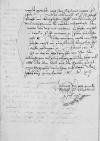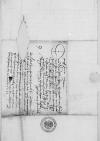List #5258
Ioannes DANTISCUS do Albrecht I von Hohenzollern-AnsbachHeilsberg (Lidzbark Warmiński), 1541-04-14
Rękopiśmienne podstawy źródłowe:
Pomocnicze podstawy źródłowe:
Publikacje:
| ||||||||||
Tekst + aparat krytyczny + komentarz Zwykły tekst Tekst + komentarz Tekst + aparat krytyczny
 GStA PK, HBA, C1 No 741, 3 unnumbered
GStA PK, HBA, C1 No 741, 3 unnumbered
Dem durchlauchten, hochgebornen furst(en) und herren, hern
 GStA PK, HBA, C1 No 741, 1 unnumbered
GStA PK, HBA, C1 No 741, 1 unnumbered
Durchlauchter, hochgeborner furst, hochgunstiger, lieber her und freundt. / Unsere freuntliche und vleis willige dinste zuvoran. /
Wir haben gerne aus E(wer) F(urstlichen) D(urchlauch)t cf.  GStA PK, HBA, C1 No 741, 2 unnumbered werde gesendt, / was im hirinne weiter zuthun. / Das abermals E(wer) F(urstliche) D(urchlauch)t scharffe brieffe von koniglichem hoffe uberkommen, / ist unvorborgen, / wie die werden ausgebracht, / derh paper damaged⌈[h]h paper damaged⌉alben wir uns mit weiterm anzeigen enthalte paper damaged⌈[te]te paper damaged⌉n, / weil E(wer) F(urstliche) D(urchlauch)t antwort gnugsam zur sachen be paper damaged⌈[be]be paper damaged⌉richt etc. Nichts wenigers wolle wir solchs [...] paper damaged⌈[...][...] paper damaged⌉glicher weiss an gute freunde koniglichs hof[...] paper damaged⌈[...][...] paper damaged⌉ lassen gelangen etc. Hiemit wir E(wer) F(urstlichen) paper damaged⌈[F(urstlichen)]F(urstlichen) paper damaged⌉ D(urchlauch)t in dieser heyligen zeit / von Got dem almechtigen vil glugseliger, gesunder zeitt / und alles, das dem leibe und der seelen gut ist, / trewhertziglich wunschen und bitten. /
GStA PK, HBA, C1 No 741, 2 unnumbered werde gesendt, / was im hirinne weiter zuthun. / Das abermals E(wer) F(urstliche) D(urchlauch)t scharffe brieffe von koniglichem hoffe uberkommen, / ist unvorborgen, / wie die werden ausgebracht, / derh paper damaged⌈[h]h paper damaged⌉alben wir uns mit weiterm anzeigen enthalte paper damaged⌈[te]te paper damaged⌉n, / weil E(wer) F(urstliche) D(urchlauch)t antwort gnugsam zur sachen be paper damaged⌈[be]be paper damaged⌉richt etc. Nichts wenigers wolle wir solchs [...] paper damaged⌈[...][...] paper damaged⌉glicher weiss an gute freunde koniglichs hof[...] paper damaged⌈[...][...] paper damaged⌉ lassen gelangen etc. Hiemit wir E(wer) F(urstlichen) paper damaged⌈[F(urstlichen)]F(urstlichen) paper damaged⌉ D(urchlauch)t in dieser heyligen zeit / von Got dem almechtigen vil glugseliger, gesunder zeitt / und alles, das dem leibe und der seelen gut ist, / trewhertziglich wunschen und bitten. /
Dat(um)
q(ui) sup(ra) ma(n)u p(ro)pria s(ub)s(cripsi)t adscribed, in the hand of Dantiscus⌈ q(ui) sup(ra) ma(n)u p(ro)pria s(ub)s(cripsi)t q(ui) sup(ra) ma(n)u p(ro)pria s(ub)s(cripsi)t adscribed, in the hand of Dantiscus⌉


